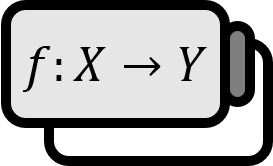Hermite Polynomials' Recursive Relations
Theorem
The Hermite polynomials satisfy the following recursive relation.
$$ \begin{align} H_{n}^{\prime}(x) &= 2nH_{n-1}(x) \\ H_{n+1}(x) &= 2xH_{n}(x)-2nH_{n-1}(x) \\ &= 2xH_{n}(x)-H_{n}^{\prime}(x) \nonumber \end{align} $$
Proof
$(1)$
Solving using the Generating Function
Generating function of the Hermite polynomials
$$ \Phi (x,t) = e^{2xt-t^{2}}=\sum \limits _{n=0}^{\infty} H_{n}(x)\frac{t^{n}}{n!} $$
Differentiating the generating function of the Hermite polynomials gives,
$$ 2te^{2xt-t^{2}} = \sum \limits _{n=0}^{\infty}H_{n}^{\prime}(x)\frac{t^{n}}{n!} $$
Then, the left side, by the definition of the generating function, is,
$$ 2t\sum \limits _{n=0}^{\infty} H_{n}(x)\frac{t^{n}}{n!}=2te^{2xt-t^{2}}=\sum \limits _{n=0}^{\infty}H_{n}^{\prime}(x)\frac{t^{n}}{n!} $$
Rearranging gives,
$$ \begin{align*} \sum \limits _{n=0}^{\infty}H_{n}^{\prime}(x)\frac{t^{n}}{n!} &= \sum \limits _{n=0}^{\infty} 2tH_{n}(x)\frac{t^{n}}{n!} \\ &= \sum \limits _{n=0}^{\infty}2(n+1)H_{n}(x)\frac{t^{n+1}}{(n+1)!} \end{align*} $$
Comparing the coefficients of $\dfrac{t^{n}}{n!}$ in both sides gives,
$$ H_{n}^{\prime}(x)=2nH_{n-1}(x) $$
■
Solving using the Differential Operator
$$ H_{n}(x)=(-1)^{n}e^{x^{2}}\frac{ d ^{n}}{ dx^{n} }e^{-x^{2}} $$
Let’s denote the differential operator as $D = \dfrac{d }{dx}$. Differentiating the Hermite polynomial once gives,
$$ \begin{align*} DH_{n}(x) &= D\left[ (-1)^{n}e^{x^{2}}D^{n}e^{-x^{2}} \right] \\ &= (-1)^{n}2x e^{x^{2}}D^{n}e^{-x^{2}}+(-1)^{n}e^{x^{2}}D^{n+1}e^{-x^{2}} \\ &= (-1)^{n}2x e^{x^{2}}D^{n}e^{-x^{2}}+(-1)^{n}e^{x^{2}}D^{n}\left[ (-2x)e^{-x^{2}}\right] \end{align*} $$
Applying the Leibniz rule to the second term gives $$ \begin{align*} DH_{n}(x) &= (-1)^{n}2x e^{x^{2}}D^{n}e^{-x^{2}}+(-1)^{n}e^{x^{2}}\sum \limits _{k=0}^{n}\frac{n!}{(n-k)!k!}D^{k}(-2x)D^{n-k}e^{-x^{2}} \\ &= (-1)^{n}2x e^{x^{2}}D^{n}e^{-x^{2}}+(-1)^{n}e^{x^{2}}\sum \limits _{k=0}^{1}\frac{n!}{(n-k)!k!}D^{k}(-2x)D^{n-k}e^{-x^{2}} \\ &= (-1)^{n}2x e^{x^{2}}D^{n}e^{-x^{2}}+(-1)^{n}e^{x^{2}}\left[ -2xD^{n}e^{-x^{2}}-2nD^{n-1}e^{-x^{2}} \right] \\ &= 2n(-1)^{n+1}e^{x^{2}}D^{n-1}e^{-x^{2}} \\ &= 2n(-1)^{n-1}e^{x^{2}}D^{n-1}e^{-x^{2}} \\ &=2n H_{n}(x) \end{align*} $$ The second equality is valid when $k\ge 2$ is $D^{k}(-2x)=0$.
■
$(2)$
The proof follows the same methodology as for $(1)$. Differentiating the generating function for $t$ gives,
$$ (2x-2t)\sum \limits _{n=0}^{\infty}H_{n}(x)\frac{t^{n}}{n!}=(2x-2t)e^{2xt-t^{2}}=\sum \limits _{n=0}^{\infty}H_{n}(x)\frac{t^{n-1}}{(n-1)!} $$
Reorganizing gives,
$$ \sum \limits _{n=0}^{\infty}H_{n}(x)\frac{t^{n-1}}{(n-1)!}=\sum \limits _{n=0}^{\infty}\left[2xH_{n}(x)-2tH_{n}(x)\right]\frac{t^{n}}{n!} $$
Comparing the coefficients of $\dfrac{t^{n}}{n!}$ on both sides gives,
$$ H_{n+1}(x)=2xH_{n}(x)-2tH_{n}(x) $$
Furthermore, by $(1)$ the following is true,
$$ H_{n+1}(x)=2xH_{n}(x)-H_{n}^{\prime}(x) $$
■
